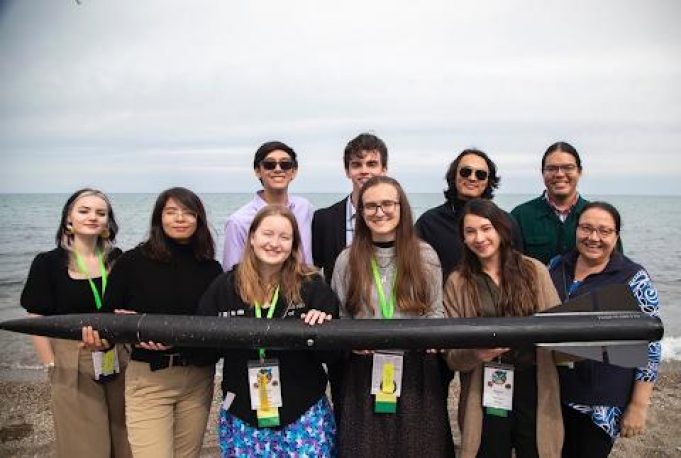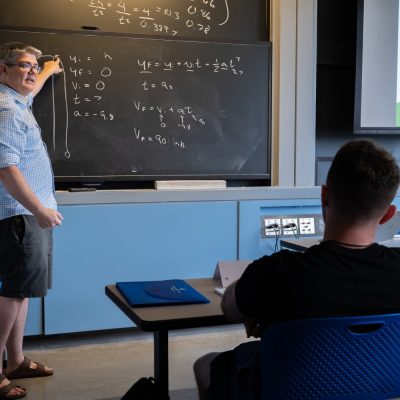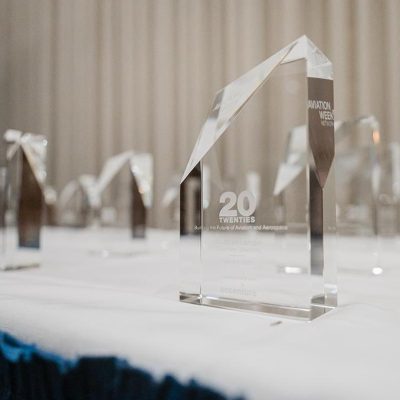
The Beaver visits Father Sky: MIT’s First Nations Launch Team builds and flies its first rocket
MIT’s First Nations Launch team participated in the 2023 First Nations Launch, an international NASA-Artemis Student Challenge hosted by the Wisconsin Space Grant Consortium that focuses on Indigenous representation and science in aerospace engineering through rocketry. It was the first time MIT has ever competed in this challenge, now in its 15th year.
An all-Indigenous team of eight students, including both undergraduates and grad students, came together across two semesters to design, build, test, document, present, and launch a roughly 8-foot rocket made from scratch entirely at MIT. This year’s challenge in particular required the team to develop carbon fiber and fiberglass composite layup techniques in order to create an airframe that was as light as possible while maintaining structural integrity. The team was advised by Professor Jeffrey Hoffman and Nina Lytton, Spiritual Advisor to the Indigenous Community at MIT, as well as supported by Aaron Ashley 16’, president of Indigenous Alumni of MIT and First Nations Launch Mentor. The team was sponsored by MIT’s chapter of the American Indian Science and Engineering Society, the Edgerton Center, and the Massachusetts Space Grant Consortium.
“I didn’t really think I’d be joining a rocket team, and then I’d heard there was an all-Indigenous build team starting. I thought, yeah, this could be a good way to connect to the community here,” says Peyton Meader, a Passamaquoddy Tribal member who’d just arrived at MIT as a first-year and served as the team’s safety/avionics lead.
The team chose the name Doya (ᏙᏯ), meaning “beaver” in the Cherokee language; the name was suggested by team member Hailey Polson, who is a Cherokee citizen. At the First Nations Launch contest in April, MIT Doya successfully blasted their rocket to a height of 1,290 meters, ultimately receiving the second place grand prize award. The team was also named rookie team of the year.
2023 MIT First Nations Launch team:
Nicole McGaa, team captain (Oglala Lakota)
Juan Alvarez (Musica)
Maranda Cherry (Métis Nation)
Alvin Harvey (Diné (Navajo Nation))
Ryann Hee (Kānaka Maoli)
Peyton Meader (Passamaquoddy)
Jeremy Minniear (Pechanga)
Hailey Polson (Citizen of the Cherokee Nation)
Smudge before launch
Built into MIT Doya’s approach are the Indigenous ethos of relationality and intentionality, and values such as efficiency—using minimal materials to reduce waste, and respectful purpose—taking time to consider alternatives and try ideas with the goal of advancing knowledge and understanding, rather than the fastest route to success.
After the rocket was completed, the team performed a smudging ceremony by Lake Michigan before the competition began. Smudging is a blessing and purification ritual that typically involves burning sage and which is an important Indigenous cultural practice.
“Taking a journey to the stars and the sky is a very Indigenous concept, and it’s something that’s very close to us in all our stories. To visit Father Sky in that way, and go with respect, to try to find out new things and carry with it our hopes and send our good wishes. I think Indigenous people are drawn to aerospace for that fact,” says McGaa. “I think Western rocketry is very hesitant to commit to the heart of what we’re doing….To me, Indigenous methodology and aerospace engineering is pushing away from that, and having the bravery to say, aerospace is something that is for our minds, for our inspiration, for the wonder of it all—and that alone is enough.”
The Doya team is now gearing up for the 2024 First Nations Launch Challenge, and they are actively seeking new team members across the MIT community. This year, AeroAstro sophomore Hailey Polson has stepped up as captain, while McGaa, now in her senior year, is serving as project manager.
Learn more and find out how to join here.

